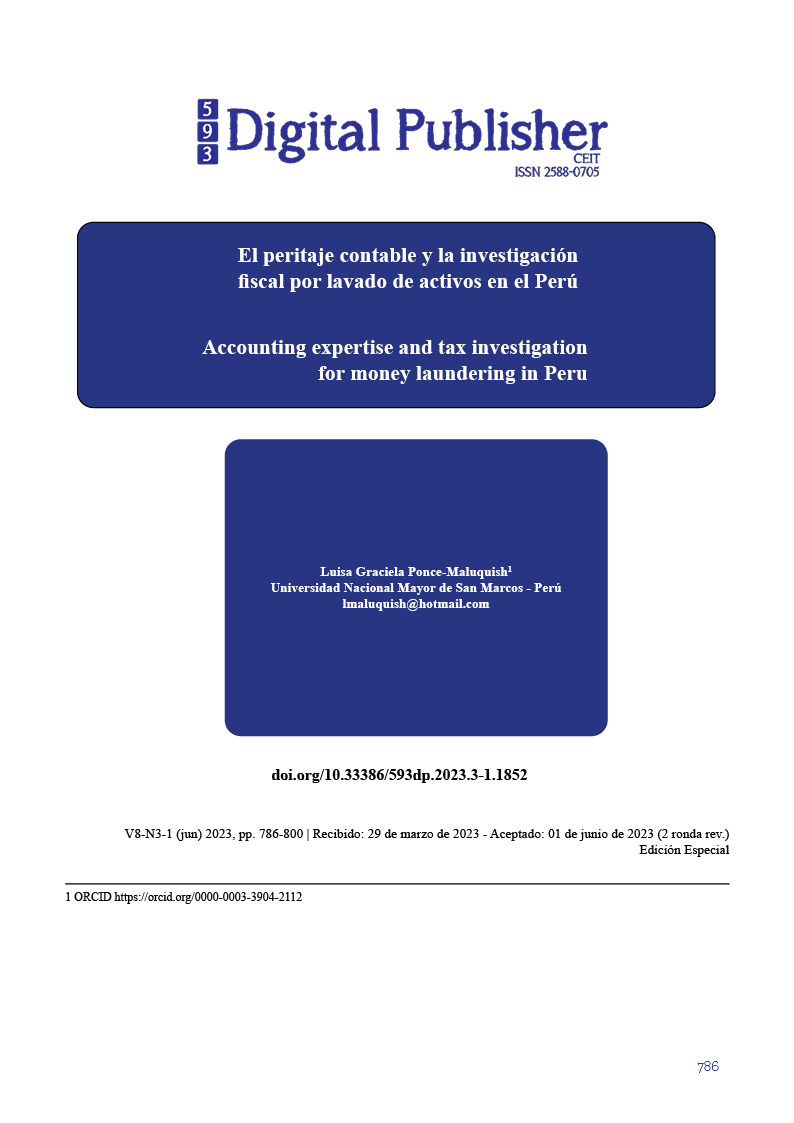Accounting expertise and tax investigation for money laundering in Peru
Main Article Content
Abstract
Objective: Determine the relationship of the accounting expertise with the tax investigation for money laundering in Peru.
Method: The research was applied, non-experimental, quantitative, correlational and cross-sectional. The sample consisted of 63 legal professionals (34 accounting experts and 29 prosecutors (deputy and head)). The technical collection procedure was the survey, with the questionnaire as an instrument. The analysis was developed through descriptive and bivariate analysis, using Spearman's Correlation test.
Results: It was evidenced that the accounting expertise has a significant relationship with the tax investigation for money laundering (rho=0.824; p=0.000). In addition, the dimensions identification of economic facts to obtain value judgments (rho=0.617; p=0.000), control over the content of the expert report (rho=0.704; p=0.000) and the valuation of the accounting expert report (rho =0.682; p=0.000) are significantly related to the tax investigation for money laundering. However, the planning of the accounting expert act procedure (rho=0.221; p=0.082) is not significantly related to the tax investigation for money laundering.
Conclusion: The accounting expertise has a strong and positive significant relationship with money laundering investigations in Peru.
Downloads
Article Details

This work is licensed under a Creative Commons Attribution-NonCommercial-ShareAlike 4.0 International License.
1. Derechos de autor
Las obras que se publican en 593 Digital Publisher CEIT están sujetas a los siguientes términos:
1.1. 593 Digital Publisher CEIT, conserva los derechos patrimoniales (copyright) de las obras publicadas, favorece y permite la reutilización de las mismas bajo la licencia Licencia Creative Commons 4.0 de Reconocimiento-NoComercial-CompartirIgual 4.0, por lo cual se pueden copiar, usar, difundir, transmitir y exponer públicamente, siempre que:
1.1.a. Se cite la autoría y fuente original de su publicación (revista, editorial, URL).
1.1.b. No se usen para fines comerciales u onerosos.
1.1.c. Se mencione la existencia y especificaciones de esta licencia de uso.
References
Abad, M., Rodríguez, E., Mucha, A., & García, J. (2020). Peritaje contable en los procesos judiciales y su incidencia en la administración de justicia en casos de lavado de activos. Rev. Horizonte Empresarial, 7(1), 42-51. http://bit.ly/3YE4TB6
Abu-Tapanjeh, A., & Al-Sarairah, T. (2021). The Availability of Forensic Accounting Application Factors to Enhance the Auditors Efficiency in Jordan. Journal of Asian Finance, Economics and Business, 8(3), 807-819. http://bit.ly/3YSTux9
Achim, M., & Borlea, S. (2020). Economic and Financial Crime. Corruption, shadow economy, and money laudering. Springer. Switzerland. https://www.google.com.pe/books/edition/Economic_and_Financial_Crime/ag76DwAAQBAJ?hl=es-419&gbpv=0
Alarcón, J. (2018). El peritaje contable laboral y su contribución en la administración de justicia de la Corte Superior de Lima Metropolitana 2016 [Tesis de Licenciatura, Universidad de San Martin de Porres]. Repositorio institucional. https://bit.ly/3xIJsCR
Cabello, V. (2020). Administración de justicia y peritajes en procesos de lavado de activos: Corte Superior Nacional de Justicia Penal Especializada 2018”. [Tesis Doctoral, Universidad César Vallejo]. Repositorio institucional. https://bit.ly/3xuyz7T
Cindori, S., & Petrovic, T. (2018). The Significance of Assessing Money Laundering Risk as a Part of Auditing Operations. Athens Journal of Business & Economics, 4(1), 69-82. https://bit.ly/3sYUgYW
Córdova, E. (2020). Enfoques epistemológicos de la prueba pericial en los procesos judiciales por lavado de activos en la Sala Penal Nacional, 2018 [Tesis Doctoral, Universidad Privada de Tacna]. Repositorio institucional. https://bit.ly/2OrLvIa
Chiavenato, I. (2016). Planeación estratégica. Fundamentos y aplicaciones. 3ra ed. Editorial McGraw-Hill Interamericana. https://www.remax-accion.com.ar/wp-content/uploads/2021/04/127-Planeacion-estrategica-fundametos-chiavenato-idalberto.pdf
Dujovski, N., & Mojsoska, S. (2019). The role of the police in anti-money laundering. Journal of Money Laundering Control, 22(1), 145-157. https://dx.doi.org/10.1108/JMLC-01-2018-0008
Fernández, A. (2020). Repercusiones jurídico penales del caso “Lava Jato” (Brasil) en la megacorrupción y el delito de lavado de activos en el Perú. Revista Científica Investigación Andina, 1(1), 01-12. http://repositorio.uancv.edu.pe/handle/UANCV/4987
Fitzpatrick, D. (2017). A “think piece” on intelligence, investigation and prosecution. Journal of Financial Crime, 24(3): 449-460. https://dx.doi.org/10.1108/JFC-03-2017-0018
Gómez, J., & Jamapa, N. (2019). Pericia contable y lavado de activos en Cooperativas de Ahorro y Crédito del Perú. Quipukamayoc, 27(55), 25-29. https://bit.ly/3aMFAWr
Guerrero, A., Marín, M., & Bonilla, D. (2019). El lavado de activos y su influencia en la productividad y el desarrollo económico de un país. Revista Espacios. 40(18), 22-32. https://bit.ly/3YRRZ2u
Hernández, R., Fernández, C., & Baptista, P. (2014). Metodología de la investigación. (6.a ed.) México: McGraw-Hill. https://www.uca.ac.cr/wp-content/uploads/2017/10/Investigacion.pdf
Instituto de Democracia y Derechos Humanos (2018). El delito de lavado de activos: el ingreso del dinero de origen ilícito en la economía formal, por Flavio Puchuri. Pontifica Universidad Católica del Perú. https://bit.ly/3usPuDM
Khan, A., & Akhtar, N. (2021). Legal, Administrative and Judicial Framework in Pakistan to Combat Tax Evasion and Money Laundering: An Analytical Study. Review of Politics and Public Policy in Emerging Economies, 3(1), 69-77. https://doi.org/10.26710/rope.v3i1.1761
Molla, V., Norton, S., Moradi, M., & Salehi, M. (2021). The anti-money laundering expectations gap in Iran: auditor and judiciary perspectives. Journal of Money Laundering Control, 24(4), 681-692. https://bit.ly/3vr1xCs
Mortelli, J. (2017). La Prueba Pericial Consideraciones sobre la prueba pericial y su valoración en la decisión judicial. REDEA, Derechos en Acción, 2(4), 130-139. https://www.corteidh.or.cr/tablas/r37709.pdf
Nación, J. (2019). El peritaje contable judicial y su incidencia en las decisiones en los juzgados penales del Distrito Judicial de Huánuco-período 2017 [Tesis Doctoral, Universidad Nacional Hermilio Valdizán]. Repositorio institucional. https://bit.ly/3vsXaqr
Oliva, M. (2021). Money laundering, food activities and mafia: evidences from the Italian provinces. Journal of Money Laundering Control, 25(3), 609-624. https://doi.org/10.1108/JMLC-08-2021-0085
Páucar, M. (2021). El rol del fiscal en la investigación del delito de lavado de activos. Anuario de Derecho Penal, (2011-2012), 129-155. https://www.cervantesvirtual.com/nd/ark:/59851/bmc1066104
Prado, R. (2022). Tributación y pericia contable de Mypes en proceso de lavado de activos 2018-2019. Puriq. Revista de Investigación Científica, 4(5), e237. https://doi.org/10.37073/puriq.4.1.237
Raouf, N. y Raouf, H. (2021). The role of the Judicial Accountant in Curbing the Money Laundering Process (Applied research in Rafidain Bank). Indian Journal of Economics and Business, 20(4), 765-785. https://www.ashwinanokha.com/resources/v20-4%20-%2021-47.pdf
Reina, V., Arias, W., Maldonado, C., Carrera, P., & Castro, L. (2020). El Peritaje Contable y su contribución como prueba a la Administración de Justicia Cantón Ibarra. Revista Universidad y Sociedad, 12(5), 69-74. https://bit.ly/3XKMXTY
Rivera, R. (2020). Control de la prueba pericial en medios digitales. Instituto Colombiano de Derecho Procesal. Bogotá, Colombia. https://icdp.org.co/programa-2021-sep-6/
Rodríguez, M., Ugaz, A., Gamero, L., & Schonbohn, H. (2012). Manual de la investigación preparatoria del proceso penal común. Conforme a las previsiones del Nuevo Código Procesal Penal Nº957. 2da. Ed. Lima, Perú: Ediciones Nova. https://bit.ly/3eET9s8
Rodríguez, M. (2013). El proceso común, vía emblemática del código procesal penal 2004 (CPP) y su primera etapa: La investigación preparatoria. Foro Jurídico, (12), 231-239. https://revistas.pucp.edu.pe/index.php/forojuridico/article/view/13817
Sánchez, H., Reyes, C., & Mejía, K. (2018). Manual de términos en investigación científica, tecnológica y humanística. Lima, Perú: Universidad Ricardo Palma. https://www.urp.edu.pe/pdf/id/13350/n/libro-manual-de-terminos-en-investigacion.pdf
Shaalan, N., & Shaalan, F. (2018). The Need to Accounting and Judicial Auditing and the Expected Effects of Their Application on the Detection of Financial and Administrative Irregularities (An Exploratory Study in Iraqi Accounting Environment). Academy of Accounting and Financial Studies Journal, 22(2), 1-23. http://bit.ly/4163ip5
Syed, S., Zolkaflil, S., & Omar, N. (2019). Mitigating financial leakages through effective money laundering investigation. Managerial Auditing Journal, 34(2), 189-207. https://dx.doi.org/10.1108/MAJ-03-2018-1830
Tuñón, M., Charres, H., & Borbúa, A. (2019). El perito contable. Revista FAECO sapiens, 2(2), 1-5. https://bit.ly/3v0QDVA
Vitvitskiy, S., Kurakin, O., Pokataev, P., Skrlabin, O. & Sanakolev, D. (2021). Formation of a new paradigm of anti-money laundering: The experience of Ukraine. Problems and Perspectives in management, 19(1), 354-363. https://dx.doi.org/10.21511/ppm.19(1).2021.30
Zolkaflil, S., Omar, N. & Syed Mustapha Nazri, S. (2019). Implementation evaluation: a future direction in money laundering investigation. Journal of Money Laundering Control, 22(2), 318-326. https://dx.doi.org/10.1108/JMLC-03-2018-0024


